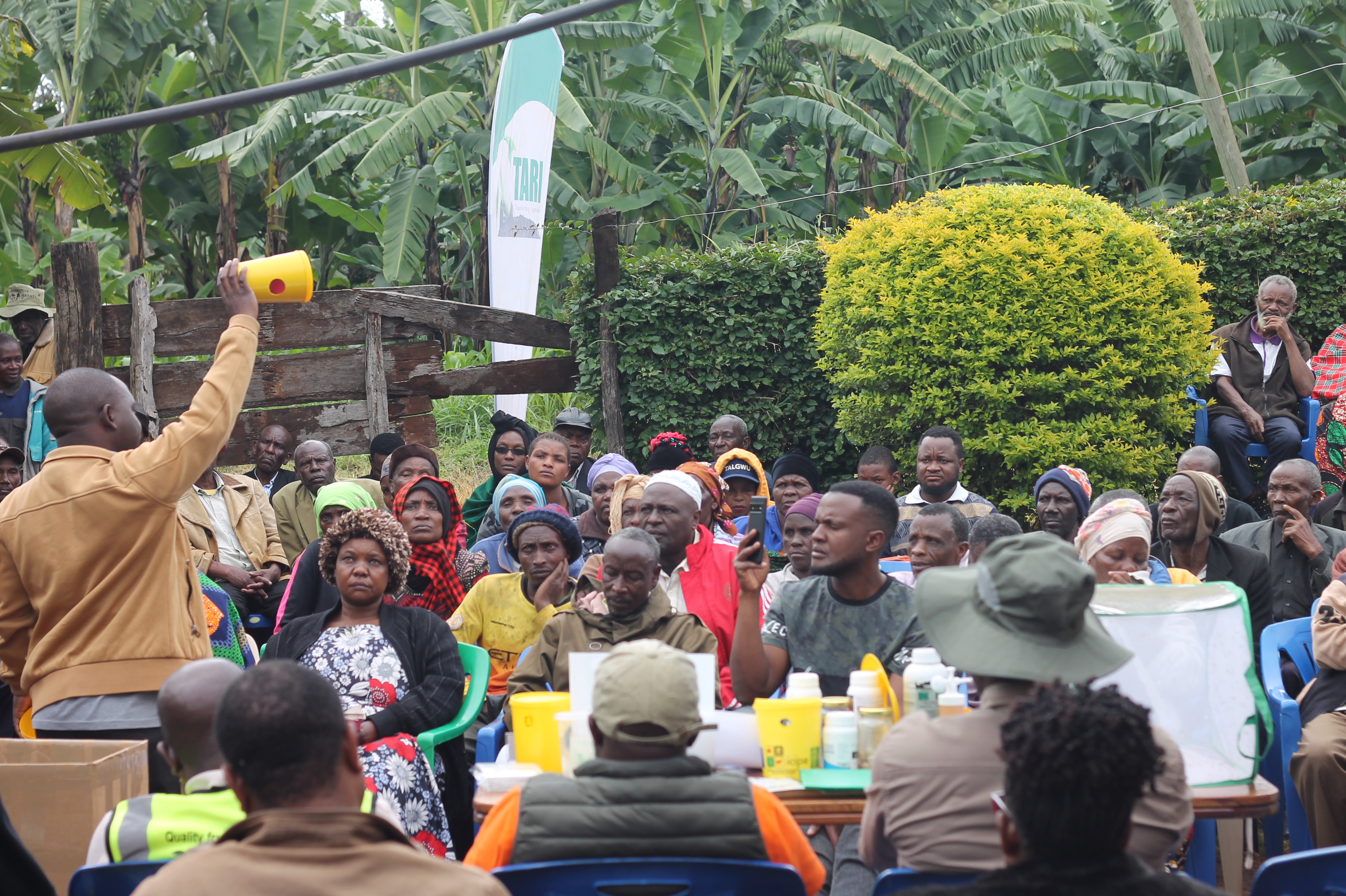TARI AND ICIPE LINK GROWERS WITH PEST MANAGEMENT INPUT SUPPLIERS FOR SUSTAINABLE FRUIT PRODUCTION IN TANZANIA
- 28th June, 2025 07:03
- By DAUSON.MALELA

Event Date: 01-01-1970
Venue:
Inputs for Integrated Pest Management (IPM) are set to be easily accessed by fruit tree farmers to boost their capabilities in suppressing fruit flies and false codling moths. The eco-friendly IPM technologies, which include on-farm monitoring, the use of biopesticides, male annihilation, baiting techniques, the use of natural enemies including parasitoids, as well as orchard sanitation, especially the use of Augmentorium, aim to minimize the use of chemical pesticides in combating pests to increase productivity and fruit quality.
This move is part of the implementation of the Fruit tree agroecological-based IPM project, which is implemented in Kilimanjaro and Tanga Regions under the Tanzania Agricultural Research Institute (TARI) in collaboration with the International Centre of Insect Physiology and Ecology (icipe).
The project's lead scientist, Dr. Abdullah Mkiga, who is also the TARI Kifyulilo Centre Manager, revealed that after training extension officers and farmers in Siha and Muheza Districts on the IPM technologies, we noticed that the demand for the input increased. Hence, linking the fruit growers to ensure the sustainable availability of the technologies is crucial.
“We began by training farmers, and many are motivated to adopt these technologies, but the challenge remaining was the availability of the inputs. Therefore, during the training, we involved the private sector, particularly companies and agro-dealers, and linked them with farmers,” said Dr. Mkiga immediately after completing the training of 324 farmers and 31 agricultural experts held last week in Kishisha villages in Siha District, Ngomeni, and Palamba villages in Muheza District, Tanga Region. Additionally, there is an ongoing effort to establish learning sites in villages that are easily accessible to many growers so they can participate in trainings, field days, and other technology dissemination activities. Three learning sites have been launched.
“Agro-dealers and farmers will contact companies that import or produce these inputs to ensure area-wide integrated pest management. In this way, the targeted pest populations will decrease, and farmers will consequently maximize profit,” added Dr. Mkiga, who is also a senior entomologist at TARI.
Fruit trees are among the farming activities relied upon by many farmers in Kilimanjaro and Tanga regions. In Kilimanjaro Region, farmers mostly produce avocados, while Tanga Region has more mango and orange producers.
Tanga Regional agricultural officer Mr. George Mbaga says pests have been major reasons for the decline in fruit production and quality; therefore, the introduction of IPM technology will greatly boost production.
“Oranges and mangoes are widely grown in almost all districts of Tanga Region except in some parts of Lushoto and Bumbuli. The issue of pests, especially fruit flies, has been a long-standing problem and has been reducing production for our farmers, so TARI and icipe bringing us this technology will increase productivity and quality of the crops,” he said.
For his part, Dr. Shepard Ndlela, a researcher from icipe, said fruit production is profitable if growers adhere to Good Agricultural Practices.“Many farmers face marketing challenges, but they have to be responsible in protecting fruit trees against pests. This will lead to quality yields and attract domestic and international markets,” he said.
The Fruit tree agroecological-based IPM project is being implemented with funding from the German Corporation for International Cooperation (GIZ) through ICIPE, beginning in 2023. In its implementation, about 538 stakeholders have already been trained on Integrated Pest Management technologies. The number includes farmers, lead farmers, extension officers, and other stakeholders in Hai, Siha, and Muheza Districts. Some of the farmers who tested the technologies say the bundle is easy to use and will assure high fruit productivity and quality.
“These technologies are easy for farmers to use. If all of them are used properly, it is easy to control pests,” said Ms. Juliana Swai, an agro-dealer in Muheza.
“At first, I didn’t know about friendly and enemy insects for the farmer. But now I know, and the good thing is we have been trained on how to control enemy insects,” said Ismail Guga, a mango and orange farmer in Ngomeni village, Muheza.
“In general, these technologies are good. For example, once you set a trap, you are sure to catch the insect at any time because a male insect will definitely come knowing that there is a female insect,” said Wilson Makule, an avocado farmer in Kishisha Village, Siha District.

